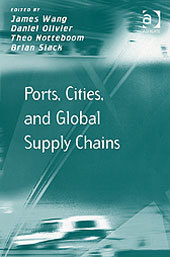Description
Ports, Cities, and Global Supply Chains
Transport and Mobility Series
Coordinators: Wang James, Olivier Daniel, Notteboom Theo, Slack Brian
Language: English
Subjects for Ports, Cities, and Global Supply Chains:
Keywords
Port Authorities; container; Container Terminals; terminal; APM Terminal; shipping; Ect; lines; Port; operators; Transhipment Hubs; gioia; Container Port; tauro; Terminal Op; laem; Global Supply Chains; chabang; ITOs; international; Supply Chains; Shipping Lines; Port City Interface; Port Hierarchy; Gateway Ports; HPH; Shipping Networks; Terminal Operations; Tanjung Pelepas; Port Competitiveness; Container Throughput; Public Port Authorities; Hub Ports; Port Counties; PSA International
Publication date: 07-2007
Support: Print on demand
Publication date: 11-2016
· 15.6x23.4 cm · Paperback
Description
/li>Contents
/li>Biography
/li>
These books may interest you

Port Management 147.69 €

Port Economics 184.47 €

Port Economics 74.82 €

